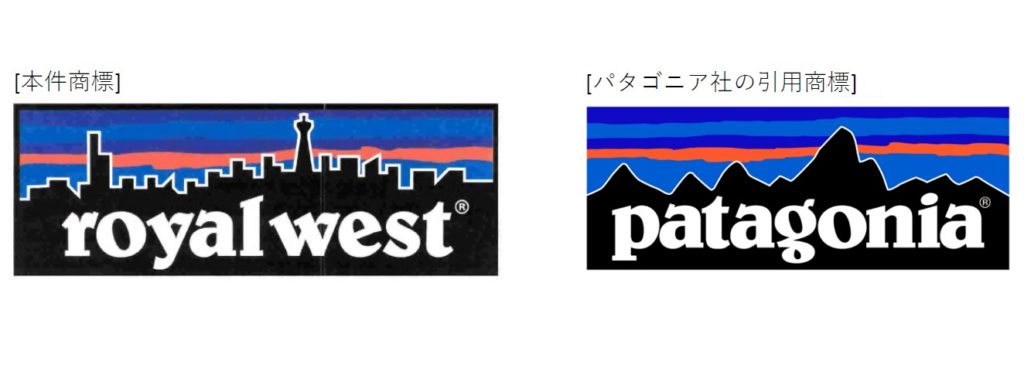The Trial Board of Japan Patent Office (JPO) recently upheld an invalidation petition by US outdoor apparel company, Patagonia Inc. against TM Reg. no. 6028801 for the “royalwest” mark in combination with figurative elements due to a likelihood of confusion with Patagonia logo.
[Invalidation case no. 2018-890048, Gazette issue date: June 28, 2019]
TM Registration no.6028801
Disputed mark, consisting of a word “royalwest” and figurative elements (see below left), was applied for registration on April 13, 2017 in respect of apparels and other goods in class 25.

Without confronting with a refusal during substantive examination, disputed mark was registered on March 23, 2018.
Petition for invalidation
Japan Trademark Law provides a provision to retroactively invalidate trademark registration for certain restricted reasons specified under Article 46 (1).
US outdoor apparel company Patagonia Incorporated filed a petition for invalidation against disputed mark on June 29, 2018. Patagonia argued it shall be invalidated due to similarity to an owned senior trademark registration no. 5891980 for the Patagonia mark with figurative elements depicting mountain landscape and sky in blue, purple and orange color (see above right), and a likelihood of confusion with its famous brand when used on designated goods in class 25 based on Article 4(1)(xi) and (xv) of the Trademark Law.
Board decision
At the outset, the Board admitted the Patagonia logo has acquired a high degree of popularity and reputation as a source indicator of Patagonia Inc. among relevant consumers in connection with outdoor goods.
In assessing similarity of both marks, the Board found that a literal element of respective mark is unquestionably dissimilar. However, even if both marks give rise to a different pronunciation and concept, by taking account of similar factors: (1) coloring of the sky, (2) font design and size, (3) rectangular outline, (4) black silhouette with a white border line, (5) configuration and proportion of respective elements, and balancing them comprehensively, relevant consumers with an ordinary care at the sight of both marks would conceive a same impression from appearance and associate disputed mark with Patagonia. If so, it is obvious that visual similarity plays a key role in the assessment. A phonetic and conceptual difference arising from literal element is insufficient to negate similarity between the marks in its entirety.
Based on the foregoing, the Board concluded that, from totality of circumstances and evidences, relevant traders or consumers are likely to confuse or misconceive a source of disputed mark with Patagonia or any entity systematically or economically connected with the opponent when used on apparels and any other designated goods in class 25 and declared invalidation based on Article 4(1)(xi) and (xv).
 Masaki MIKAMI, Attorney at IP Law – Founder of MARKS IP LAW FIRM
Masaki MIKAMI, Attorney at IP Law – Founder of MARKS IP LAW FIRM

